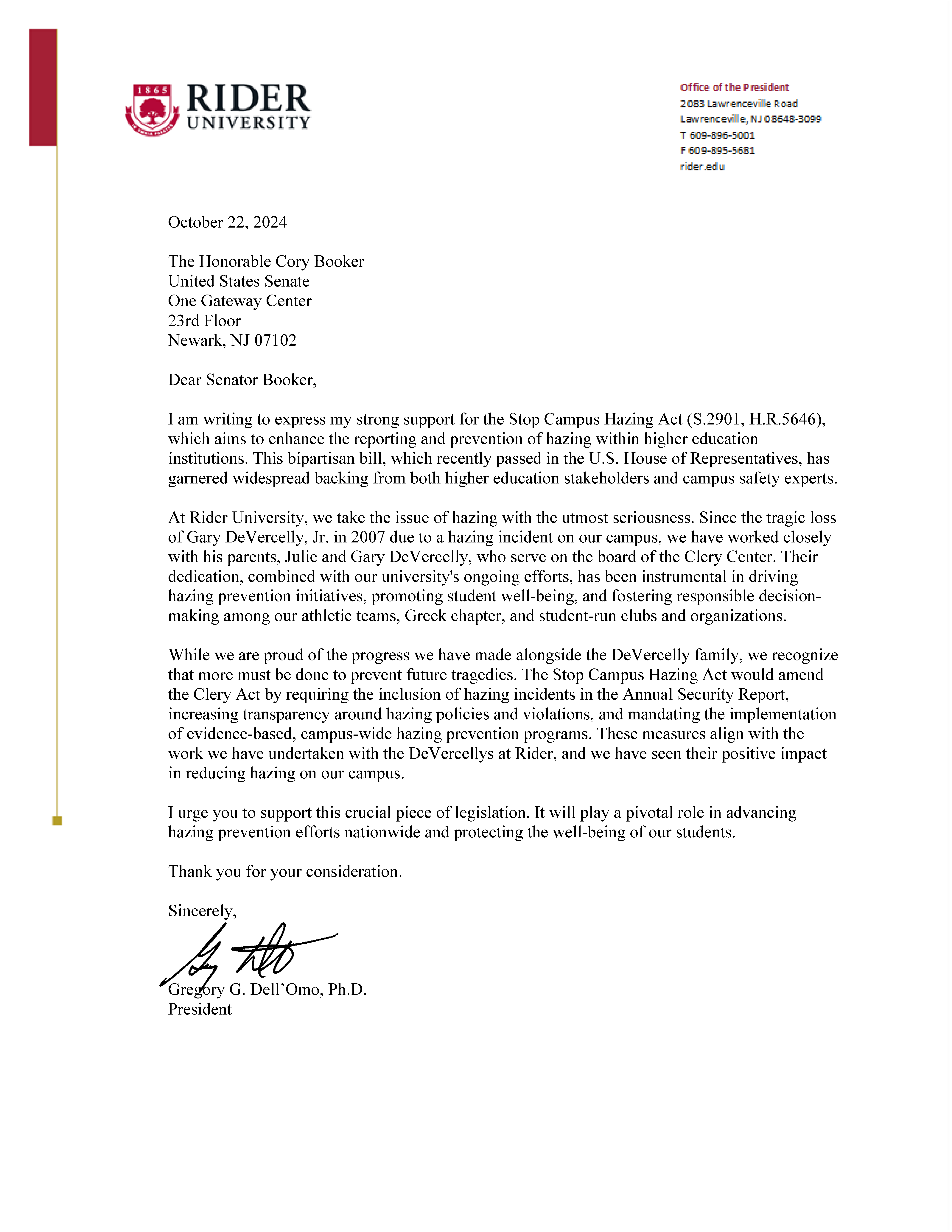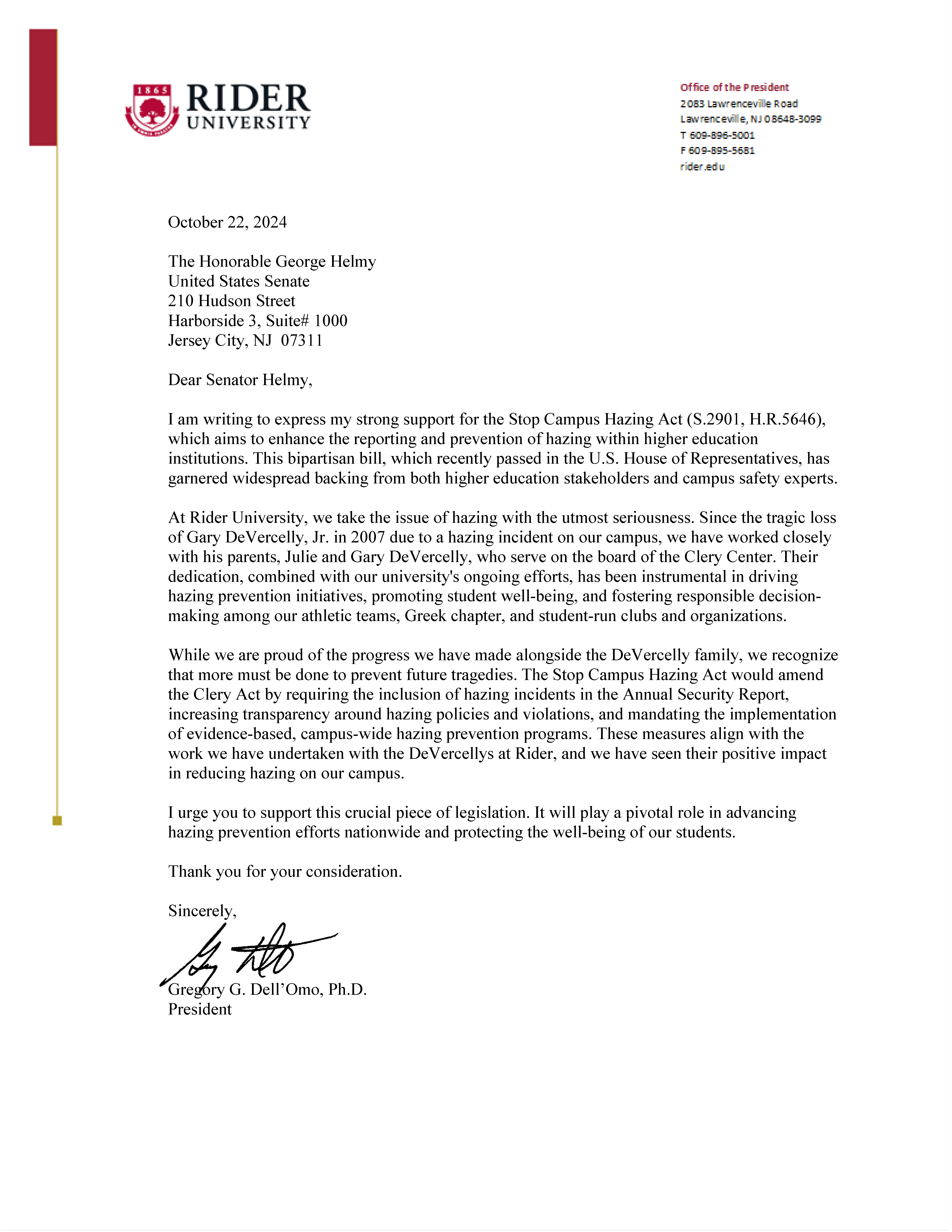Clery Center Announces Leadership Transition
On behalf of the Clery Center board of directors, I want to share the bittersweet news that our executive director, Jessica Mertz, will be moving on to an exciting new role with the Girl Scouts of Eastern Pennsylvania, with her last day at Clery Center being February 21.
While we are sad to see Jess leave, we are incredibly grateful for her leadership and the lasting impact she has made during her time with Clery Center. Under her guidance, we have strengthened our commitment to campus safety, expanded our outreach and training programs, and played a critical role in advancing policies that protect students. Most notably, Jess’s leadership was instrumental in the passage of the Stop Campus Hazing Act, a landmark piece of legislation that enhances transparency and prevention efforts nationwide.
During one of the most challenging times in recent history, Jess led the organization through the COVID-19 pandemic, adapting programs to support the field while ensuring the well-being of our staff and community. She spearheaded the development and successful implementation of a five-year strategic plan, raising the organization's visibility, growing our membership program, and providing a strong foundation for Clery Center’s ongoing growth and impact. This included establishing Clery Center’s National Advisory Council, bringing together campus-based professionals from diverse roles and backgrounds to provide insight into the evolving landscape of campus safety, and the launch of an new Individual Membership tier, making our resources more accessible to campus professionals. Throughout her tenure, Jess has prioritized policies, processes, and partnerships centered around our mission and our core organizational values, fostering a culture of collaboration, inclusion, and sustainability.
As we begin this transition, we are pleased to share that Abigail Boyer, associate executive director, will step in as interim executive director, as she has done so effectively during previous leadership transitions. Abigail is a seasoned leader in campus safety, driving Clery Center’s mission since 2012 and spearheading nationwide initiatives to enhance prevention and response to campus violence. She successfully leads strategic partnerships, develops educational resources, and delivers expert guidance, while also shaping national conversations on the Clery Act. Abigail’s deep knowledge of our mission and her dedication to our work will ensure that we continue moving forward without interruption.
The board has already begun the search for our next executive director with the support of Andrew C. Wheeler at Lincoln Leadership. We are committed to finding a leader who will continue to advance our mission and build on the strong foundation that Jess, in partnership with the exceptional team and board, helped establish.
Please join us in thanking Jess for her years of dedication to Clery Center and wishing her all the best in her new role and future endeavors. You can read Jess’s letter about her departure here. We look forward to staying connected as she continues her work to empower and support young people.
With gratitude,
Sheilah Vance, Esq.
Chair, Board of Directors
Clery Center |
|
Press Contact:
Matt Davis Communications
[email protected]
917-526-9530
FOR IMMEDIATE RELEASE
Senate Passes Stop Campus Hazing Act, Landmark Legislation to Combat Hazing on College Campuses
[Washington, DC, December 11, 2024] Today, the United States Senate passed the Stop Campus Hazing Act, a bipartisan bill aimed at preventing hazing on college campuses nationwide. The bill, which previously passed the House of Representatives, will now go to the President's desk to be signed into law.
The Stop Campus Hazing Act requires colleges and universities to implement comprehensive hazing prevention programs and to publicly report hazing incidents in their Annual Security Reports (Clery Reports). The bill increases transparency for students and parents by requiring institutions to disclose their hazing prevention policies and any organizations found in violation of these policies.
“We set out to make sure what happened to our son never happened again. No parent should have to bury their child, yet our son, Gary Jr., died of acute alcohol poisoning because of a fraternity hazing ritual at Rider University in 2007. Since then we have been urging Congress to pass legislation to curb hazing on college campuses, and the day has finally come,” said Julie and Gary DeVercelly. "This bill will save lives and make a real difference in the fight against hazing."
"The Stop Campus Hazing Act is a major victory for student safety. Every student deserves to feel safe at school, and families have the right to know the scope of hazing on college campuses. You can’t address a problem without first recognizing it, and this Act will increase transparency and raise awareness. Its passage is a testament to the tireless advocacy of hazing survivors, families, and organizations nationwide, as well as the dedication of its lead sponsors: Senator Amy Klobuchar (MN), Senator Bill Cassidy (LA), Representative Lucy McBath (GA), and Representative Jeff Duncan (SC)," said Jessica Mertz, Executive Director of the Clery Center.
This research-backed hazing prevention legislation will shift societal norms and structures that contribute to hazing, provide the public with more reliable information about hazing incidents, and support colleges and universities in preventing hazing,” said Dr. Elizabeth J. Allan, Professor of Higher Education at the University of Maine and Principal at StopHazing. “It will also empower students to make informed decisions about their involvement in campus organizations. Clery statistics and transparency reports, like those available at HazingInfo.org, will help students and families make more informed decisions.”
The Stop Campus Hazing Act is a significant step forward in the effort to end hazing on college campuses. By increasing transparency, accountability, and prevention, the legislation will help to create a safer and more welcoming environment for all students.
About Clery Center
Clery Center is a national nonprofit dedicated to helping college and university officials meet the standards of the Jeanne Clery Act. By equipping professionals with the training and resources they need to understand compliance requirements, we strive to make campus safety a universal reality. More at clerycenter.org.
About Stop Hazing
StopHazing’s mission is to promote safe and inclusive school, campus, and organizational environments through research, resource sharing, and the development of data-driven strategies for hazing prevention and the promotion of positive and inclusive group climates. More at StopHazing.org
|
|
Rider University President Voices Support for Stop Campus Hazing Act
Rider University’s commitment to campus safety and hazing prevention is strongly reflected in letters of support for the Stop Campus Hazing Act from President Gregory G. Dell’Omo, Ph.D. These letters, addressed to Senator Cory Booker (D-NJ) and Senator George Helmy (D-NJ), underscore Rider’s dedication to advancing hazing prevention efforts nationwide, especially in the wake of the tragic loss of Gary DeVercelly, Jr., a Rider student who passed away in 2007 as a result of hazing.
The Stop Campus Hazing Act (S.2901, H.R.5646), which passed in the U.S. House of Representatives and now heads to the Senate, would amend the Clery Act to require institutions to include hazing incidents in their annual security reports, enhance transparency of hazing policies and violations, and establish mandatory hazing prevention programs. Rider University has worked closely with the DeVercelly family, who serve on the board of Clery Center, to implement similar initiatives on campus, setting a powerful example for other institutions.
President Dell’Omo emphasizes that this legislation will be pivotal in advancing hazing prevention nationwide. We’re grateful for his advocacy, as well as the ongoing efforts of the Rider community, to help create safer, more accountable campus environments.
Read the letters (click to view larger):


|
|
FOR IMMEDIATE RELEASE
Contact: Kristen Sweeney, Director of Communications, Clery Center at [email protected]
Date: September 24, 2024

Bipartisan "Stop Campus Hazing Act" Passes House, Advances to Senate
WASHINGTON, D.C. – In a significant step toward addressing the dangers of hazing on college campuses, the bipartisan Stop Campus Hazing Act (H.R. 5646, S. 2901) has passed the House of Representatives and is now moving to the Senate for consideration. Co-led by Representatives Lucy McBath (D-GA) and Jeff Duncan (R-SC) in the House and Senators Amy Klobuchar (D-MN) and Bill Cassidy, M.D. (R-LA) in the Senate, the bill represents a unified, bipartisan effort to improve campus safety nationwide.
The Stop Campus Hazing Act builds on the momentum of two previous bills—the Report and Educate About Campus Hazing (REACH) Act and the End All Hazing Act—to create a more comprehensive approach to preventing and reporting hazing incidents. Over 50 organizations, including Clery Center, StopHazing, SAFE Campuses LLC, the American College Health Association (ACHA), the Association of Fraternity/Sorority Advisors (AFA), the Association of Fraternal Leadership & Values, and the Anti-Hazing Coalition, have endorsed the bill.
Since 2017, Clery Center has played a key role in shaping federal anti-hazing legislation, driven by the advocacy of board members Julie and Gary DeVercelly, whose son Gary DeVercelly Jr. was tragically killed by hazing in 2007. “Over the past 35 years, the Clery Act has fundamentally transformed campus safety by requiring crucial measures to improve transparency and prevent harm,” said Jessica A. Mertz, executive director of Clery Center. “The passage of the Stop Campus Hazing Act marks a significant milestone in our ongoing mission to create environments that prioritize the safety and well-being of the campus community. Today, we not only honor the many lives lost to hazing, but we recognize the harmful impact that hazing culture continues to have across the country.”
The Stop Campus Hazing Act will amend the Clery Act by introducing three critical requirements for institutions of higher education (IHEs):
- Hazing Reporting: IHEs must report known incidents of hazing in their Annual Security Report and submit these statistics annually to the Department of Education.
- Transparency Report: IHEs must maintain a publicly accessible transparency report, detailing their hazing policies and listing organizations that have violated those policies.
- Prevention Programs: IHEs are required to offer research-informed, campus-wide hazing prevention programs.
“Policy is a vital component of harm prevention, and I’m confident this research-informed bipartisan bill will make a substantial difference in transforming campus hazing culture,” said Elizabeth J. Allan, Ph.D., Professor of Higher Education at the University of Maine and Principal at StopHazing. “Research shows that many students are uninformed about hazing, so I’m especially encouraged that the bill includes a requirement to educate students about the dangers of hazing.”
Additionally, the bill will rename the Jeanne Clery Disclosure of Campus Security Policy and Campus Crime Statistics Act to the Jeanne Clery Campus Safety Act to reflect its broader scope, which now addresses hazing as part of campus crime prevention.
Advocacy Driven by Family Losses
This legislation has been shaped by the tireless advocacy of families who have lost loved ones to hazing. Members of Congress who supported the bill have often been personally touched by these tragedies in their districts, including the co-leads, Representatives McBath and Duncan.
"[This bill is] about empowering students and families so that they can make an informed decision for themselves about what school they or their loved one attends or the club they may join and hopefully save their lives.," said Representative McBath. "I know the pain of losing a child. The only thing that we can do now is try to harness our pain and do something positive with it."
The dedication of the families raising awareness and the commitment of their representatives has played an essential role in advancing the Stop Campus Hazing Act and preventing future tragedies. “Students should feel safe no matter what school they choose,” shared Senator Cassidy. “The Stop Campus Hazing Act improves transparency and ensures hazing is never ignored.”
Senate Poised to Act on Critical Campus Safety Legislation
The Stop Campus Hazing Act now moves to the Senate, where it is expected to garner further bipartisan support. Advocates are hopeful that the bill will continue its momentum and reach President Biden's desk for signing into law.
“When parents send their kids away to college, they expect they will get a good education and make new friends. Unfortunately, too many are also exposed to hazing, a dangerous—and at times deadly—problem,” said Senator Klobuchar. “Our bipartisan legislation will improve hazing prevention efforts on college campuses to make sure we have the information we need to stop this abuse and keep students safe.”
The passage of this bill in the House marks a historic moment in the fight against hazing on college campuses. Once signed into law, this legislation will build upon the Clery Act’s existing framework to enhance institutional policies, procedures, and prevention efforts, and promote a deeper understanding of hazing’s devastating impact.
“Hazing has almost become an acceptable part of college culture,” said Representative Thompson during the House Committee on Education & the Workforce Markup. “Let me be clear today: Those days are over.” |
|